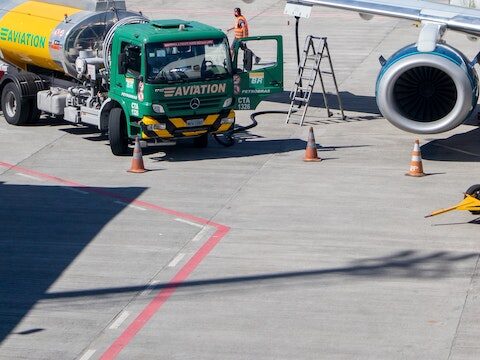14th October, 2021
The UK Government has proposed an amendment to the UK Emissions Trading Scheme (UK ETS) legislation to allow aviation biofuel (one type of sustainable aviation fuel or SAF) to be treated as having zero emissions as long as it meets the sustainability criteria in the Renewable Transport Fuel Obligation (RFTO).
What is the UK ETS?
- The UK ETS, which works on a ‘cap and trade’ principle, replaced the EU ETS on 1st January 2021, following the UK’s withdrawal from the EU.
- It sets an upper limit (or cap) on CO2 emissions from energy intensive industries operating in the UK, which decreases over time.
- Airlines must participate, with the ETS applying to all UK domestic flights, as well as flights departing from the UK to the EU (with flights from EU states to the UK potentially being covered by the EU ETS).
- Airlines are permitted a number of free ‘allocations’ which cover a certain level of emissions from their flights per year. Once these allocations are used, airlines must buy unused allocations from other operators or sectors.
Counting aviation biofuel as having zero emissions would mean that no allocations would need to be surrendered for that fuel. AEF has a number of concerns about this:
SAFs are not zero emission fuels!
Whilst SAFs may have a role in helping to decarbonise the aviation sector, the Government should not be basing its policy on an assumption that SAFs deliver 100% emissions savings. ‘Lifecycle analysis’ (LCA) is an approach to determine a fuel’s full environmental impact. Currently fuels delivering a 50% emissions saving or more can benefit from the RTFO policy referred to above. We have some concerns about the appropriateness of LCA estimates for determining future policy. Sometimes LCA can, for example, include avoided emissions (e.g. methane avoidance from the waste sector in the production of waste-based aviation fuels). However, these emissions savings will need to happen anyway in order for the waste sector itself to shift to net zero, thus reducing the apparent emissions savings of many SAFs. Nevertheless, LCA offers a route towards determining the real emissions savings from a given fuel that is preferable to assuming a 100% emissions saving, as the Government proposes for aviation biofuel.
Once burnt, SAFs emit at least as much CO2 as kerosene, and as such, should only be considered to offer a ‘net’, and not ‘actual’ emissions reduction.
SAFs should be counted according to their true emissions savings
The Government has indicated that counting aviation biofuels as zero emissions under the UK ETS is a ‘stop gap’ measure to incentivise their usage while a more nuanced approach is developed. We do not accept, however, that ‘100% emissions reductions’ is an appropriate stop gap assumption. Since all fuels will need to have undertaken an LCA analysis in order to qualify for the RTFO, claimed emissions reductions for each fuel should be the value of the emissions credit that it is awarded. If this is not possible, the minimum standard of 50%, or the average greenhouse gas reduction of qualifying aviation biofuels, would be more appropriate as a stop gap.
UK ETS should not provide additional SAF incentives
SAF usage should be incentivised as appropriate through the SAF mandate, on which the Government recently consulted. The UK ETS should provide an accurate accounting mechanism for CO2 emissions across the economy, and a means of delivering our climate goals in a cost-efficient way. Giving aviation biofuels a zero rating under the UK ETS would fail to do this as it would under-report on actual emissions, and allow airlines a benefit not afforded to other participating sectors.
The aviation sector has a history of being given favourable treatment in policy. This has to stop if the sector is to achieve net zero.
To read our full response, click here.
